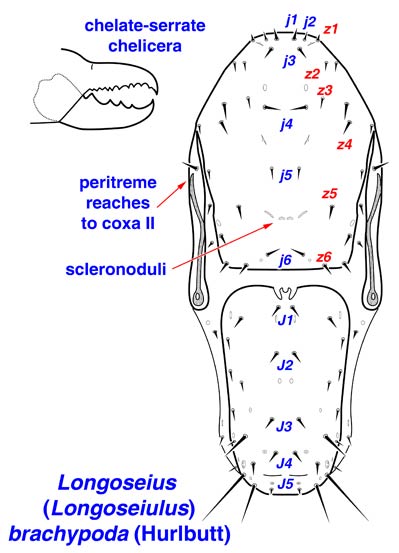
Home | Mesostigmata (Monogynaspida) Home | Glossary
Longoseiulus
Taxonomic Position
Cohort Gamasina
Subcohort Dermanyssiae
Superfamily Rhodacaroidea
Family: Digamasellidae Evans
Longoseius (Longoseiulus) Lindquist
Diagnostic characters:
Body narrow and elongate and with two dorsal shields
Podonotal shield with 18 pairs of setae
Female with entire sternal shield
2 pairs of scleronoduli
Trochanter I with 5 or 6 setae; trochanter III with 4 setae; palpgenu with 6 setae
Peritreme in adults and deutonymphs similar, reaching to about coxa II
Similar taxa.
Other narrow and elongate mesostigmatans are typically found in the
pores of polypore fungi and have a holodorsal shield, e.g. see
Mycolaelaps and
Hoploseius tenuis.
Although less elongate, some species of
Protogamasellus and
Protogamasellopsis somewhat resemble Longoseius (Longoseius)
but most lack scleronoduli. Species of Longoseius (Longoseiulus)
are less narrow than L. (Longoseius) and have scleronoduli and
podonotal shields with full complements of j, z, and s
setae.
Ecology & Distribution. The described species of Longoseius (Longoseiulus) are found beneath bark in association with wood boring beetles in the families Cerambycidae, Elateridae and Pyrochroidae and are phoretic as deutonymphs under the elytra of the beetles.
1. Body extremely narrow and elongate, length 2.5-4 times width; trochanter III with 4 setae..................................... Longoseius
- Body subrectangular to oval in shape; trochanter III with 5 setae............................... 2
2. Scleronoduli present under podonotal shield between setae z5; anal opening normal; seta z3 present on podonotal shield................................ 3
- Scleronoduli absent; anal opening large; seta z3 absent from podonotal shield ......Digamasellus
3. Movable digit of female usually with 4 or more teeth; subcapitulum with 5 rows of denticles 4
- Movable digit of female with 3 teeth; subcapitulum with 6 rows of denticles........Dendroseius
4. Opisthonotal shield truncate or bilobed posteriorly and often with several pairs of spatulate setae; setae j2 inserted well behind setae j1-z1 on podonotal shield.....................................................Dendrolaelaspis
- Opisthonotal shield convex posteriorly and usually notched anteriorly; setae j2 more or less aligned with j1-z1 on podonotal shield ............................................................................... Dendrolaelaps
References
Chant DA. 1961. A new genus and species of mite in the family Digamasellidae Evans (Acarina). Acarologia 3: 11-13.
Kinn DN. 1984. Life cycle of Dendrolaelaps neodisetus (Mesostigmata: Digamasellidae), a nematophagous mite associated with pine bark beetles (Coleoptera: Scolytidae). Environmental Entomology 13(4): 1141-1144
Lindquist EE. 1975. Digamasellus Berlese, 1905, and Dendrolaelaps Halbert, 1915, with descriptions of new taxa of Digamasellidae (Acarina : Mesostigmata). Canadian Entomologist 107: 1-43.
Womersley, H. 1954. Two new species of mites (Acarina : Mesostigmata : Ascidae) associated with bark-boring beetles from South Australia. Records of the South Australian Museum 11: 113-116.